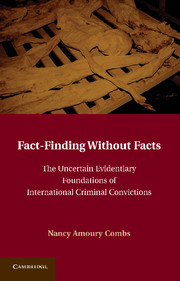 Fact-Finding without Facts
Fact-Finding without Facts Book contents
- Frontmatter
- Contents
- Acknowledgments
- Introduction
- 1 The Evidence Supporting International Criminal Convictions
- 2 Questions Unanswered: International Witnesses and the Information Unconveyed
- 3 The Educational, Linguistic, and Cultural Impediments to Accurate Fact-Finding at the International Tribunals
- 4 Of Inconsistencies and Their Explanations
- 5 Perjury: The Counternarrative
- 6 Expectations Unfulfilled: The Consequences of the Fact-Finding Impediments
- 7 Casual Indifference: The Trial Chambers' Treatment of Testimonial Deficiencies
- 8 Organizational Liability Revived: The Pro-Conviction Bias Explained
- 9 Help Needed: Practical Suggestions and Procedural Reforms to Improve Fact-Finding Accuracy
- 10 Assessing the Status Quo: They Are Not Doing What They Say They Are Doing, but Is What They Are Doing Worth Doing?
- Conclusion
- Bibliography
- Index
- References
7 - Casual Indifference: The Trial Chambers' Treatment of Testimonial Deficiencies
Published online by Cambridge University Press: 05 October 2010
- Frontmatter
- Contents
- Acknowledgments
- Introduction
- 1 The Evidence Supporting International Criminal Convictions
- 2 Questions Unanswered: International Witnesses and the Information Unconveyed
- 3 The Educational, Linguistic, and Cultural Impediments to Accurate Fact-Finding at the International Tribunals
- 4 Of Inconsistencies and Their Explanations
- 5 Perjury: The Counternarrative
- 6 Expectations Unfulfilled: The Consequences of the Fact-Finding Impediments
- 7 Casual Indifference: The Trial Chambers' Treatment of Testimonial Deficiencies
- 8 Organizational Liability Revived: The Pro-Conviction Bias Explained
- 9 Help Needed: Practical Suggestions and Procedural Reforms to Improve Fact-Finding Accuracy
- 10 Assessing the Status Quo: They Are Not Doing What They Say They Are Doing, but Is What They Are Doing Worth Doing?
- Conclusion
- Bibliography
- Index
- References
Summary
Although the problems identified in Chapters 2 through 5 are worryingly widespread and not easily remedied through other forms of evidence gathering, they need not impair the integrity of the Trial Chambers' legal judgments, so long as the Trial Chambers recognize the significance of the fact-finding impediments and treat them with the requisite seriousness. However, much of the time, Trial Chambers do neither. Some Trial Chambers fail even to mention serious testimonial deficiencies, as I observe in Chapter 6, and although other Trial Chambers do acknowledge the problems, at least in a general way, they often unquestioningly attribute those problems to innocent causes that do not impact the witness's credibility. Those attributions may be accurate in many cases, but it is by no means clear that they are in keeping with the prosecution's burden of proof. Furthermore, even if the causal attributions are accurate, the Trial Chambers frequently fail to appreciate the potential impact of testimonial deficiencies, whatever their causes. In Section 7.A, I analyze the Trial Chambers' treatment of fact-finding deficiencies, focusing first on their general observations and then on the way in which those observations are implemented in the Trial Chambers' decision making. In Section 7.B, I seek to illustrate these general findings by a comprehensive, in-depth analysis of the evidentiary underpinnings of the SCSL's CDF case.
- Type
- Chapter
- Information
- Fact-Finding without FactsThe Uncertain Evidentiary Foundations of International Criminal Convictions, pp. 189 - 223Publisher: Cambridge University PressPrint publication year: 2010


